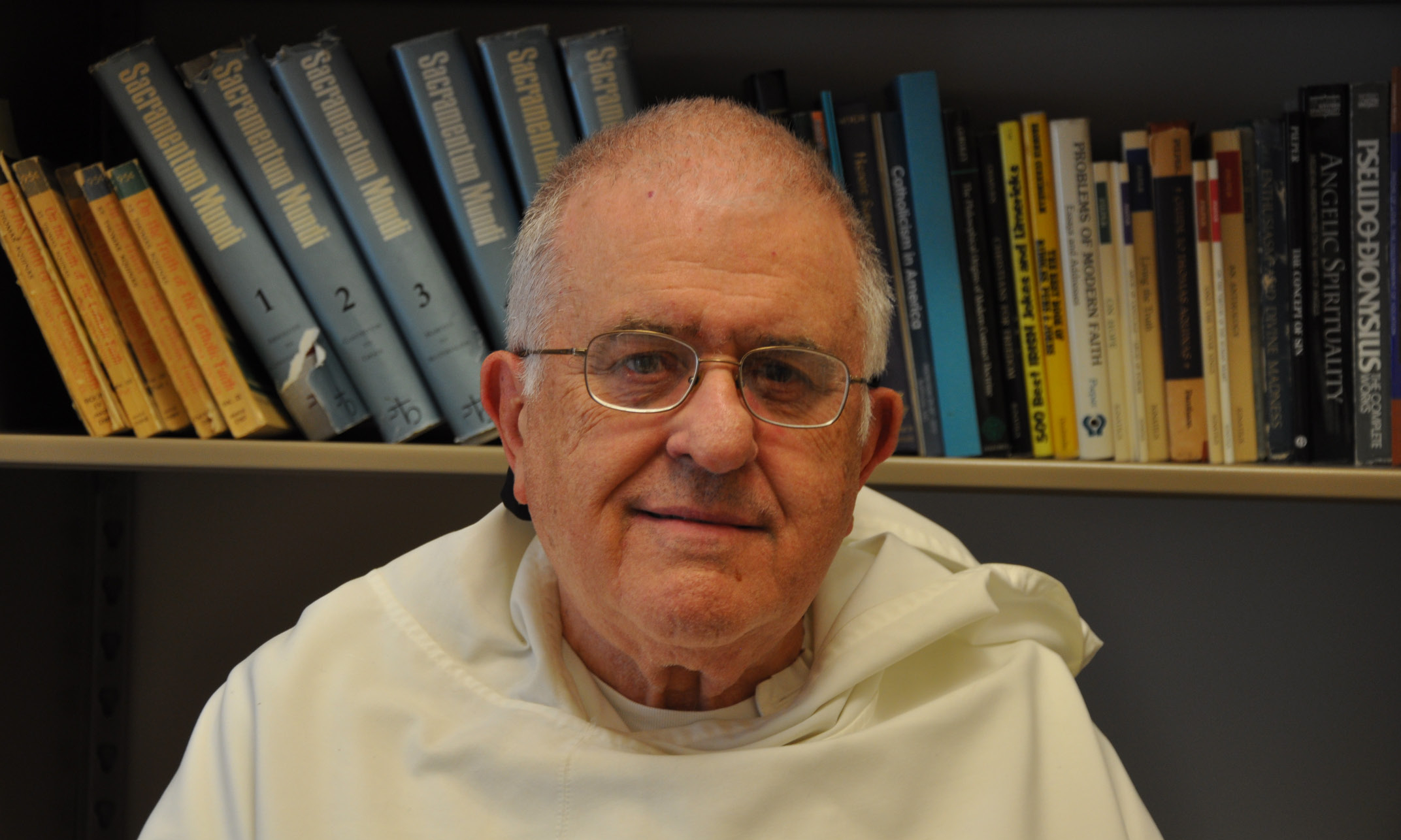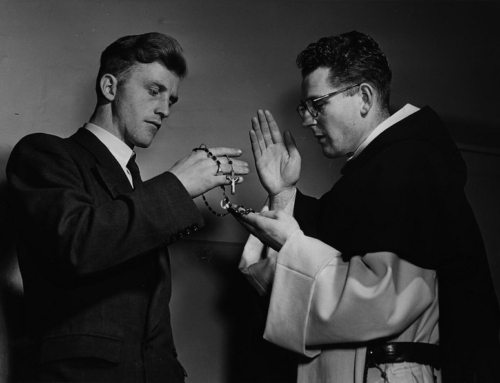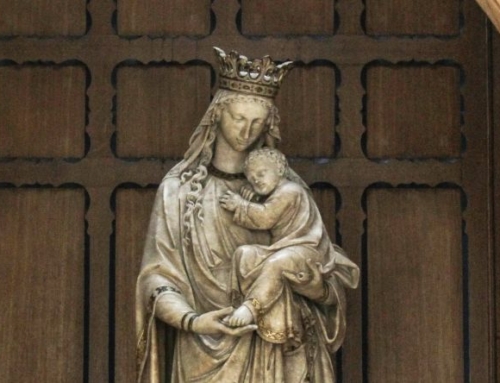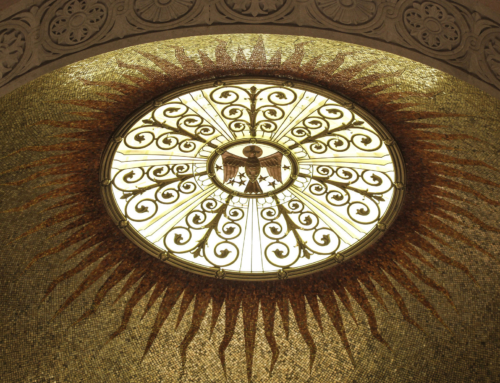Father Basil Cole is an Ordinary Professor of Moral, Spiritual, and Dogmatic Theology at the Pontifical Faculty of the Immaculate Conception (the Dominican House of Studies) in Washington, D.C. Joining the Dominicans of the Western Province in 1960, Fr. Basil was ordained to the priesthood in 1966. He earned his lectorate and licentiate degrees in 1968 at Le Saulchoir in Etiolles, France and his doctorate in Sacred Theology from the Pontifical University of St. Thomas Aquinas in Rome (the Angelicum). In addition to various teaching appointments, including the Angelicum (1985–1997), Fr. Basil has served as prior of Dominican communities in both the Western and Eastern Provinces. As a member of the Western Dominican preaching band, he preached extensively throughout the American West. Since joining the faculty at the Dominican House of Studies in 1997, Fr. Cole has continued to preach retreats and parish missions, serve as a spiritual director, and publish prolifically.
In your dissertation, you begin with your first aesthetic experience. Could you describe it for us?
I was a freshman in high school, living with my parents in San Francisco. I had purchased an album of Benny Goodman’s performance at Carnegie Hall and went to my room one evening to listen to it. There was a piece of music at the beginning, and then “Sing Sing Sing” came on. It was fifteen minutes long and had many scratches, but it had me from the beginning. I was interested from the first drum roll, and then all of a sudden, I experienced a tremendous delight, an out of this world delight. There was a sense of something more than sensual here, though there was delight in hearing the harmonies. It had a lot of surprises that were extraordinary for me at the time. That became a very, very extraordinary experience for a freshman in high school. I was caught in this wonderful experience, and I never forgot it. Of course, as I got older, I would have those experiences with Bach and other music.
What was different about jazz?
Jazz had depth that other popular music did not. If the forties and fifties were filled with sentimental diddies, the late fifties were filled with loud, repetitive, non-surprising ditties of very little importance or value. As I began to reflect on the culture in the fifties, everything began to appear so superficial. Yet, I found the depth I was looking for in jazz.
I started out as a Dixieland jazz fan, and then found the Progressive jazz of Dave Brubek, and eventually Miles Davis during my junior year of college. Davis’s famous piece, “So What,” took effort to appreciate and understand, but eventually I got it. It was because of the depth it had, and searching for that depth helped me to see deeper into myself.
Would you say that jazz has shaped your life?
Jazz, and my experience with it, touched my temperament. It made me more introspective in my high school years and more aware of mystery, that the things going on in life are not what you see here and now. That was vague at the time, but I remember getting an insight into the mystery of human life. It revealed something of my own soul to myself. The surprises and order I found in the music led me on to further interests.
Did music affect your decision to enter religious life?
Only remotely. My experience and interest in music didn’t lead me to be a better thinker. I was not a great student. However, it did lead me to literature, and I began to experience delight in reading novels. It was never as intense as music, but it encouraged my reading. In college, I discovered philosophy, and began to experience delight in the truths that surprised me. When you read philosophy you are surprised. I find that the surprises are similar to what I experienced in music. The real surprise is finding order. Discovering delight in order and truth eventually led me to theology.
So music did not lead you to enter the novitiate?
It led me to appreciate the depth of religion, what religion means. What the search for God means, spirituality, all of the above.
What led me to enter the novitiate was much more complicated than music. That’s just a piece of it. What led me to enter religious life was meeting the Trappist monks in Vina, California. During college, the Jesuit fathers always put on a three-day Ignatian retreat during the second semester. Well, I had had enough of that. So, I made arrangements to make a retreat with the monks instead. There, I saw a whole different aspect of religion: people seeking God alone without necessarily ministering to anybody. I listened to their prayer, and was moved by their chant. The Mass and Divine Office were extremely prayerful and profound. It felt as though we were touching Christ in some way.
I was also struck by how the monks treated me as a brother. There was a feeling of warmth and welcome. I realized that I couldn’t live their life, because I am not a farmer. I thought about becoming a monk, and even went to the abbey in Mt. Angel, Oregon, staying there for three months. However, I realized as soon as I arrived that I did not belong there. Fortunately, while I was staying at the monastery I read a book criticizing the Dominican Order. Apart from the imperfection of the members, the book revealed to me the mission of the Order. It was in seeing what the Dominicans were trying to do that led me to apply to the Western Dominican Province of the United States.
How was your experience with music in the novitiate?
Well, we were just beginning. So it was awful. Everything was off key. Nobody could sing. Catholics didn’t sing back then. It’s not like the Office now. The novices pick it up in three months. In those days it was awful. We never sang as well as the Trappist monks did.
Changing pace, I’d like to talk about your dissertation and some of your thoughts on music. Josef Pieper defines music as follows: “wordless expression of man’s intrinsic dynamism of self-actualization, a process understood as man’s journey toward ethical personhood.” What do you agree and disagree with in this definition?
I think that is a very good way of putting it, because great works of art are icons or similitudes of what virtue is, i.e. reason flooding the emotions, intellect, and will. And so, great works of music are always reason putting order into notes, rhythms, colors, spaces, words. Insofar as they are superb works, they simulate virtue. And that is what ethics is all about, growing in virtue. Music can be used unethically, but at heart, if the musicians are really trying to produce something beautiful, there is a similitude of virtue, which has its own beauty. There is a relationship between the two beauties which boils down to the splendor of reason. Veritatis splendor, veritatis beatitudo. There is the splendor of reason, beauty, truth, and goodness.
Pieper frames his definition under the aspect of human perfection. Is there a way of defining music apart from the human person and in its own respect?
Of course. Either or. I wouldn’t say that defining it with a view to the human person is erroneous; it’s a way of looking at it. To put it in objective terms, I think you would have to say, a work of art is an act of putting order into materials that produces surprise and splendor and that also causes a delight. This is to define music as the ordering of notes, harmony, and sounds which results in surprises and delight.
You’ve written on the practical side of music as well. Could you say a few words about that?
When I wrote my dissertation in 1987, I worked a little with the American Music Therapy Association in D.C. While I’m no expert on the issue, I do know there is science dealing with how music affects brain waves for good or ill. Combinations of alpha waves and beta waves can affect people, calming or soothing them. That’s why some dentist offices put on music before your tooth is drilled open. In more serious matters, music therapy is used to help people with depression.
It can be used for psychological purposes and, of course, for entertainment. It’s a great way to bring people together. In fact, when I was a kid, when you would go to a movie, quite often you would have sing-alongs. They’d put the words on the screen and a ball would go from word to word. They usually were songs we already knew. Unfortunately, they weren’t always the best lyrics, but they weren’t the worst. They can be used to emphasize family unity, civic unity, all the appreciation of what it means to be a member of a country.
Then there’s music for beauty. That should be the principal purpose, because it helps you to understand the transcendence of life. It’s a hit of transcendence. Pius X in Tra Le Sollecitudini, Pius XII in Musicae Sacrae, and Sacrosanctum Concilium, all speak about music and transcendence. There’s a flash of something that surprises you and grabs your attention.
It’s meant to sweeten doctrine and the difficult sayings of Christ. The beauty entices even though the truth is demanding. Though the search for truth is demanding, beauty’s enticement shows it is worth the difficulty.
In your dissertation, you downplay Thomas Aquinas’s love of music. How can you say that given the hymns he composed, such as the “Pange lingua,” “Tantum ergo,” “Adoro te devote,” and other metered hymns?
Well, I’m not infallible. I would say that he wrote the poetry and not the music. I know that he wrote it for the express purpose of it being sung. Yet, he says between music and preaching, preaching is going to produce much more devotion than anything else. He has some wooden things to say about music. So I just take it that he wrote great poems, but he didn’t have a sense for music. I’d say he was a poet and not a musician. The guy who wrote the music is a genius, in my opinion. Keep in mind that the music was not that great in the 13th Century. Music evolved immensely in the centuries after Aquinas. If you listen to St. Hildegard of Bingen’s music, it’s boring, boring, boring. The only harmony they had was the parallel fifth. They had no thirds. If Aquinas lived in the Renaissance, I think he would have changed his mind on music.
Last question, do you think that music is the art that most simulates heaven?
The idea of the heavenly music that was proposed by Aristotle and a host of other philosophers; I think it’s crazy. There’s no music in the realm of the angels because they do not have senses. Surely, there’s something of beauty, but not music. Music can exist in an active potency, ready to be played, but not in an immaterial existence like the angels.
Well, I would say that the closest art that simulates heaven is the dance, because of the divine perichoresis. The term perichoresis etymologically means “to proceed around,” and it’s used to describe the relations within the Trinity—Father and the Son, Son and the Father, the Holy Spirit in the Father and the Son. That very word perichoresis goes back to the dance. But what is a dance but two people coming together? And so heaven is a plenitude of people in a deep unity and harmony with one another personally in God and God himself in complete unity and harmony. And the word dance kind of signifies the perichoresis or interior relations of the Trinity. There is something about the dance that seems to exist more and more in heaven, because of the word “in.” All three divine persons are defined in each other in the same essence. The people in heaven are sharing in that in some way. Music is disparate, but the dance tries to hit at this inner communion.
✠
Download a PDF of this article here




